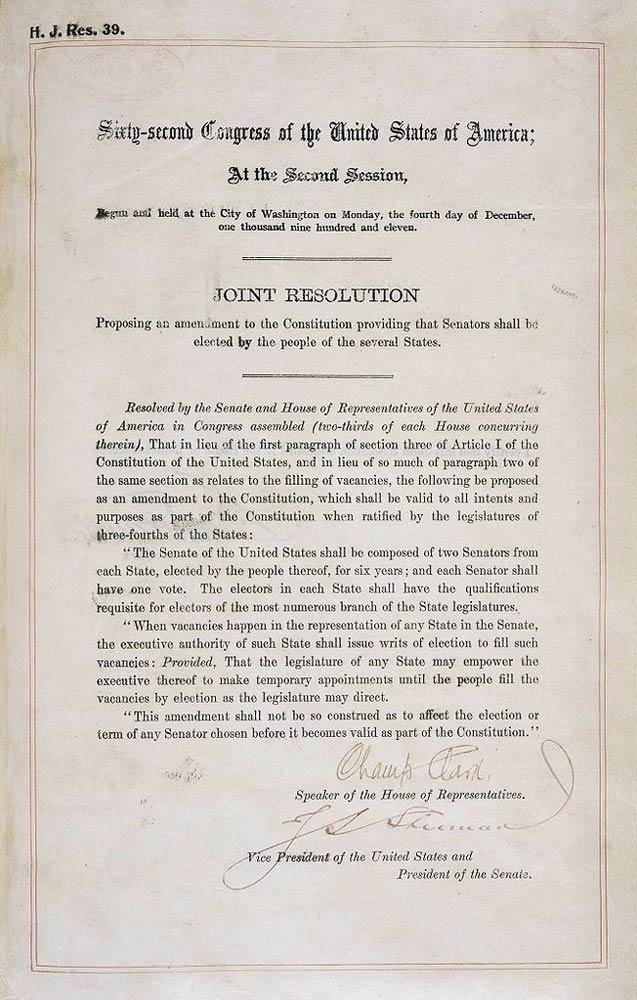| United States Constitution | |
|---|---|
 |
|
| The U.S. Constitution | |
| Preamble | |
| Articles of the Constitution | |
| I ‣ II ‣ III ‣ IV ‣ V ‣ VI ‣ VII | |
| Amendments to the Constitution | |
| Bill of Rights | |
| I ‣ II ‣ III ‣ IV ‣ V ‣ VI ‣ VII ‣ VIII ‣ IX ‣ X | |
| Additional Amendments | |
| XI ‣ XII ‣ XIII ‣ XIV ‣ XV ‣ XVI ‣ XVII ‣ XVIII ‣ XIX ‣ XX ‣ XXI ‣ XXII ‣ XXIII ‣ XXIV ‣ XXV ‣ XXVI ‣ XXVII | |
| View the Full Text | |
| Original Constitution | |
| Bill of Rights | |
| Additional Amendments |
The Seventeenth Amendment, adopted on May 31, 1913, changed the manner in which United States senators were elected. Formerly elected to office by state legislatures, the Seventeenth Amendment provided for a constitutional mandate that United States senators be elected by the popular vote of the citizens of each state. It also provided for unexpected vacancies in senatorial seats due to various reasons, including the death of a senator, by allowing the governor of the affected state to appoint a senator until a special election can be held.
Text
The Senate of the United States shall be composed of two Senators from each State, elected by the people thereof, for six years; and each Senator shall have one vote. The electors in each State shall have the qualifications requisite for electors of the most numerous branch of the State legislatures.
When vacancies happen in the representation of any State in the Senate, the executive authority of such State shall issue writs of election to fill such vacancies: Provided, That the legislature of any State may empower the executive thereof to make temporary appointments until the people fill the vacancies by election as the legislature may direct.
This amendment shall not be so construed as to affect the election or term of any Senator chosen before it becomes valid as part of the Constitution.
Historical Basis
 Originally established by the Constitution as a philosophical parallel to the British House of Lords, the United States Senate’s function was, in essence, to represent the legislature in harmony with the House of Representatives, which represented the people of the United States. The concept recognized that the House was comprised of men whose political stature was less elevated than the seasoned legislators of the Senate. This was theoretically a desirable balance of power that would ensure that both legislative branches of Congress complemented each other.
Originally established by the Constitution as a philosophical parallel to the British House of Lords, the United States Senate’s function was, in essence, to represent the legislature in harmony with the House of Representatives, which represented the people of the United States. The concept recognized that the House was comprised of men whose political stature was less elevated than the seasoned legislators of the Senate. This was theoretically a desirable balance of power that would ensure that both legislative branches of Congress complemented each other.
As the country grew with the addition of states, dissatisfaction with the electoral process of the United States Senate grew. Concerns arose over possible corruption in the state legislatures’ election of senators, including allegations that some U.S. Senate seats had been purchased, rather than elected.
There were also allegations that an imbalance of power had evolved, due to the different constituencies of the two bodies of Congress, which could result in the legislative process being deadlocked at the federal level.
Opposition to this amendment cited valid reasons for their stance as well. One of these reasons was the fear that an imbalance of power would actually result from such an amendment, rather than prevent it. These argued that having one body of Congress elected by popular vote, and another that was elected by the legislators of each state, would provide the best balance of perspective and experience in Congress. It was believed that having one body of Congress that is not dependent upon the popular vote would provide for a Senate that could remain detached from emotionally-charged legislation introduced by the House, and thus preserve the overall welfare of the nation as a whole.
Process
Dissatisfaction with the status quo system of the election of U.S. Senators began in the period from 1890 to the early 1900’s. William Jennings Bryan, a Progressive, led the campaign for reform, encountering opposition from such notables as Elihu Root and George Frisbie Hoar.
The campaign for reform quickly gained momentum throughout the states. With the advent of the year of 1910 came the realization that 31 states had passed legislation advocating reform. The process continued to grow, and the federal government began to fear that the states could adopt their own constitutional amendments to reform the manner of senate elections, and that this would result in “runaway conventions.”
In May of 1913, Congress proposed an amendment to the U.S. Constitution that would change the electoral process for United States Senators, shifting the electors from state legislators to a popular vote of the people in each state. The Seventeenth Amendment was adopted on May 31, 1913, with the declaration of adoption being made by William Jennings Bryan.
Those who opposed this amendment maintained that this change in the process for electing senators only diminished the level of representation formerly held by the states. They also claimed that state legislatures would sink into disgrace now that they had no power to elect U.S. Senators.
These opponents also raised concerns over the newly-granted power of governors to appoint temporary senators to fill seats that had been vacated, noting that it is difficult to defeat an incumbent in a special election, thus providing an inequitable shift of power to the state governors.
In Summary
The Seventeenth Amendment changed the partisan climate in the United States dramatically. Some of the seasoned senators of the former system bemoaned the “ignominy” that had taken over the federal legislature since passage of this amendment. The cooperative efforts that resulted by the House and Senate sharing the same constituency raised fears that the federal government lost any ability to keep legislation in check, especially since the original composition of the House was considered to be “commoners”, with the Senate comprised of seasoned legislators.
Even today, some legislators express concern over the provisions of Amendment 17, adding that the need for reform remains today.